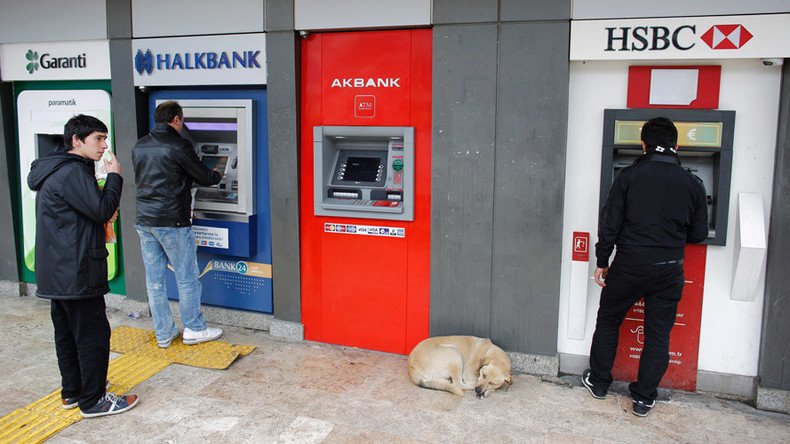Turkish banks & government sites under ‘intense’ attacks on Christmas holidays

Turkey is suffering from a wave of cyber-attacks on financial and government websites which intensified over Christmas, reportedly resulting in the temporary disruption of credit card transactions.
A video released this week and attributed to Anonymous vowed retribution for Ankara’s alleged ties with ISIS.
The attacks on Turkish servers have been persistent in recent weeks, but on Christmas day Turkish banks suffered a website outage and reportedly saw sporadic disruption to credit card transactions. Isbank, Garanti and Ziraat Bank were among the targets, local media reported.
#Banka lara #Siber#saldiri deniyor. Ya ABD nin çinden çektiğine ne demeli şu hale bak
https://t.co/MKHtV8IqWspic.twitter.com/mmiLCjybHR
— Yiğit Kaynak (@SYBEXSEC) December 25, 2015“It is hard to determine where these attacks are coming from, with detailed work it will be understood whether these attacks are carried out by hackers or by certain groups” said the Minister of Communications Binali Yildrim.
The DDoS attacks on Turkey’s ".tr" domain, Yildrim said were “serious” as they include domains of ministries, banks, and the military. The ministry asked Ankara’s Middle East Technical University (ODTU), which operates the ".tr" domain to step up security measures. ODTU’s analysis said that the attacks are coming from “organized sources” outside Turkey.
Turkish Telecom, in a statement to Hurriyet daily, said that they are now on “24/7 defense” as they acknowledged facing “thousands of attacks.” Most Turkish institutions use Turk Telekom as their service provider.
Birden fazla banka çöktü! https://t.co/xlJT9tVtOO#ziraatbankası#işbankası#siber#bankapic.twitter.com/cq3NdPkRiD
— Manşet Haber (@mansethaber) December 25, 2015“The attacks are serious,” a spokesman for internet provider Turk Telekom, Onur Oz, told Reuters. “But the target is not Turk Telekom. Instead, banks and public institutions are under heavy attack.”
The banking sector is one of the fastest growing areas of online services in Turkey and equates roughly to 1.5-2 billion transactions daily, according to Hurriyet. More than 85 percent of daily banking transactions in Turkey are carried out on digital platforms.
“These attacks began two weeks ago but have intensified over the past two days,” said Burak Atakani, a network specialist from Istanbul Technical University.
Some Turkish media outlets have speculated that the cyber-attacks might have been launched by Russia in retaliation to the downing of a Russian bomber by a Turkish fighter jet late in November over Syrian airspace.
Meanwhile in a video, released this week allegedly by hacktivist collective Anonymous, hackers promised to take on the Turkish government over its alleged shady deals with Islamic State (IS, formerly ISIS/ISIL) terrorist organization. Anonymous especially threatened to bombard the banking sector.
“Turkey is supporting Daesh [the Arabic name for IS] by buying oil from them, and hospitalizing their fighters. We won't accept that [Recep Tayyip] Erdogan, the leader of Turkey, will help [IS] any longer,” says a video message from the group. “We will continue attacking your internet, your root DNS, your banks and take your government sites down. After the root DNS, we will start to hit your airports, military assets and private state connections. We will destroy your critical banking infrastructure.”
Special Cyber government security units within the Information and Communication Technologies Authority (ICTA) and the Telecommunications Directorate (TIB) have been deployed to stop the attacks.
“Turkey is not in a position to be powerless in the face of these attacks,” said Customs and Trade Minister, Bulent Tufenkci. “I think that we’ll have necessary response.”












